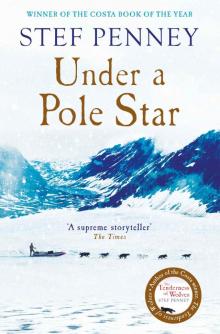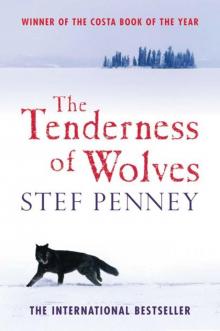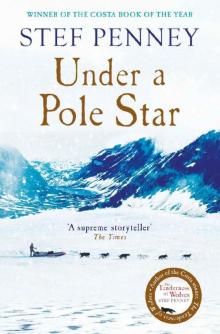- Home
- Stef Penney
The Invisible Ones Page 16
The Invisible Ones Read online
Page 16
“Where was this?”
“Cambridge. So I went up there. He’d broken his back. And at first they thought he might have brain damage.”
“How did the accident happen?”
“He was driving at night. Lost control and went into a wall.”
“Was he alone?”
“Yeah.”
“Was it icy? Was the weather particularly bad?”
“No. I don’t think so. No, just dark. They thought he’d fallen asleep.”
“Where was he going?”
“I don’t know.”
“So who did you see in the hospital?”
“Kath, Jimmy, Ivo, and Christo, of course.”
“They were together at the time?”
“No, just Tene and Ivo. Kath and Jimmy came when they realized what had happened.”
“And who told you about Rose?”
“I asked where she was, and Kath told me she’d run off with a gorjio.”
She shakes her head.
“It was a disaster. Tene’s the head of the family. The only Janko man of his generation to survive. We didn’t know if he was going to live. Then . . . it’s almost impossible to live on the road if you’re disabled. They threatened him with a care home—it would have killed him. It fell to the family to take him on, and that wasn’t easy. Kath and Jimmy and Sandra and Ivo all agreed they would stick together, so that he could stay on the road with them.”
“That was very good of them. Especially Ivo—with a sick baby to care for—quite an undertaking.”
“They didn’t know he was ill then. God, if we’d known that—maybe they wouldn’t have agreed.”
My note-taking hand slows to a halt. “Then Rose didn’t know he was ill, either.” “No, I suppose not.”
I think about this for a moment.
“Did you speak to Ivo about Rose, too?”
“Oh, I think I remember saying I was sorry about it.”
“And?”
“And nothing. He seemed dazed by the whole thing—the shock of Tene, and having a small baby to look after. Knackered, probably.”
She hesitates.
“He was never talkative. He was a sweet kid, you know. But with all that happened—his mother and sister dying . . . he sort of shut down.”
“When did they die? And . . . what of ?”
Lulu sighs again.
“Marta had lung cancer. His mother. She died when he was about fourteen. And Christina”—she exhales a stream of smoke—“died in a car crash in France. They’d been to Lourdes, of all places, for Ivo. It was Marta’s dying wish to take him there. To ask for a miracle.”
She gives a bitter little laugh. I make noises of sympathy.
“She was only seventeen.”
Her eyes slip out of focus, dwelling on something that isn’t on the table in front of her.
“I bet you’re thinking, How likely is it that one family can have had so much bad luck?”
I shake my head.
“No. I’m just sorry.”
“We couldn’t believe it. I mean . . .” Lulu lights another cigarette. “You don’t smoke, do you? Have you heard of prikaza?”
“Prikaza? No . . . ?”
“It’s from my grandfather’s side. Things don’t happen by chance. Illness isn’t bad luck. Prikaza is punishment for breaking the laws of mokady.”
“Does your family believe that?”
Lulu smiles and shakes her head slightly.
“Makes you wonder, though. One of the main reasons for prikaza was mixing too much with the gorjio.”
“Did your family do that a lot?”
“Hardly. It’s the tradition in our family to marry a first cousin. Maybe we did something even worse. Did you know that scarlet is really mokady? Like, if you wear scarlet, or paint your wagon scarlet, you get prikaza.”
I think of her red high-heeled shoes, and the last time I saw them. Mustn’t think about that. Must not. But I have a feeling she’s thinking about them, too.
“So Ivo’s reaction to Rose leaving . . . ?”
“Just no reaction, really.”
“Did you ever wonder . . . if Rose was in the car with Tene?”
She stares at me as though I’m stark raving mad.
“No! Of course not! What a weird thing to think. She was long gone. Long gone! Honestly . . .”
“Sorry, I have to ask. It’s a coincidence, though, these two things happening at about the same time.”
Lulu shakes her head in disbelief.
“Tene broke his back . . .”
I take a moment to catch up on my notes, then to ease my writing hand, which is starting to cramp. Lulu smokes with intent, as if she’s trying to burn the cigarette down as fast as possible. It’s the one thing about her that reminds me of her nephew. Lulu regards what little is left of her cigarette, having showed it who’s boss.
“Are you good at this?”
“What?”
“This private-detective stuff. Are you a good private detective?”
“I’m not doing very well at the moment.”
I say this to try to make her smile, and she does, to my delight.
She seems sincere, even in her confusions. But the information remains as slippery as ever. Times, places . . . the order in which things happened—all these shift and twist and slide out of reach just as I think I’ve got hold of something. No one remembers clearly. No one saw anything. No one was there.
Way back, when I was looking for Georgia Millington, I was at the same stage. I had nothing. No clues, no leads, no idea. I worked tirelessly. Going over the same facts, the same witnesses, talking to people again and again. And then there was the turning point: as so often happens, someone slipped up. In this case, it was a school friend of Georgia’s who gave two conflicting accounts of the last time she’d seen her. Her name was Jakki Painter. They called themselves Jak and George. She’d known where Georgia was all along.
In that case, I wish I’d failed. I wish the turning point had never come. But you don’t know what people are capable of, do you? Until they do it.
“So what are you going to do now?”
Lulu leans back in her seat, swinging one leg. I wish I could erase the image of her in that room in Richmond.
“I thought I’d ask you to dinner.”
It comes like a bolt from the blue, even to me. And the worst thing is, I’m not sure if I’m asking because I want to have dinner with her (although perhaps I do) or because I want to see if she’ll squirm.
She looks astonished. But a muscle at the corner of her mouth retracts.
“Is that allowed?”
About as allowed as screwing a vegetable, says a little voice in my head.
“Well, I’m divorced . . . single.”
“I mean as a private eye—and me in a . . . case, or whatever you call it.” “I don’t suspect you of anything.”
“Oh, um . . .”
Twice in two days. Women struck dumb by an invitation from Ray Lovell.
“I don’t know if that would be a good idea.”
“I’m sorry. You’re seeing someone . . . I should have asked.”
“Well, it’s . . . Sorry. I don’t think I should. Sorry.”
She seems genuinely embarrassed. She neither confirmed nor denied that she was involved with someone. So what does that say?
At this point, I suppose, it’s academic.
24.
JJ
I asked Mr. Lovell if he tails people. He smiled and said sometimes, but said it was boring. And he does surveillance, too. Like on the telly. He said he doesn’t carry a gun, though, so he’s not like Crockett and Tubbs from Miami Vice—more like Shoestring. I’ve been thinking—and I’ve got too many things to think about, not counting my O levels—but when I think about this I feel a bit less stupid and helpless. I think I could find out some things, about my dad, maybe. Mr. Lovell explained how you move from information to facts to evidence: that’s the investigators’ procedure. H
e said he sometimes has to go through people’s rubbish bins to find evidence (I’m still not entirely sure how evidence and facts are different, but apparently they are). He said people are very careless about what they throw away. I said, “Like what?” and he said, “Well, like credit card receipts,” which apparently show everyone what you’ve bought. I didn’t say I’ve never seen a credit card. And also things like pill packets, so you know if there’s something wrong with them. This made me feel uncomfortable—I mean, that stuff is supposed to be private, but he said that’s part of the job, and if people are doing something wrong, it’s fair enough.
If I’m clever, maybe I could find out about Ivo and Mum. Only I don’t think there’s anything in our rubbish—or in our whole trailer—that I don’t already know about. It’s so small. I mean, we’re quite good at being private from each other when we need to be, but that’s not very often. Mum’s never been that touchy about her stuff. I used to play with her jewelry when I was younger, go through her box and take out all her earrings and bracelets and lay them all out on the floor, things like that. Since then I’ve been through her things a couple of times. I’m not proud of it, but I don’t think she ever knew. I never found anything other than what you’d expect to find in a woman’s things. I thought maybe she’d have a picture of my dad, or something else of his, some clue, but I never found anything. I can’t follow Mum or Ivo when they go off in their cars. I can only ask questions while not making it too obvious what I’m asking about. I’ve tried that. So far, nothing.
So today, when I come back from school, I say I’m going fishing. I take my rod and go fishing for a bit, but nothing’s biting. I don’t catch anything except a wet bum from sitting on damp grass. After it gets dark, finally, I walk back, sticking close to the trees so no one will see me.
I can’t hear the radio from Great-uncle’s, which probably means that Gran and Granddad have taken him to the pub. Maybe everyone’s gone. The lights are out in Ivo’s trailer. I creep and stop, creep and stop, until I’m right under Ivo’s trailer window. The curtains are shut, and try as I might, I can’t see through the cracks. Then I hear a voice, but it doesn’t sound like Ivo talking, so maybe the telly’s on—something weird. Someone’s moaning. Maybe it’s a thriller.
Then I have a sensation like someone has dropped an ice cube down the back of my shirt. Because the telly isn’t on. The weird noise is coming from a person. It sounds like someone’s moaning and speaking at the same time. I listen to catch the words, but I can’t. It doesn’t even sound like English, to be honest. Maybe it’s Romanes, but I know only a few words. It’s the weirdest sound I’ve ever heard. I start to worry—what if it’s Christo and he’s ill again? It doesn’t sound like Christo, but . . . Or what if Ivo’s ill? Maybe something’s happened to him and Christo can’t help.
Then another thought hits me, like a fist in the gut. What if it’s Mum in there with Ivo, when everyone else is down at the pub. What if they’re . . .
I walk away for a few steps, not really realizing what I’m doing, and then walk up to the trailer like I’ve just got there. I deliberately walk on the stones, kicking things, making lots of noise, coughing . . . you name it. I walk right up to the door and bang on it. The moaning stops, but no one says anything. I knock again.
“Ivo? Are you there?”
Silence.
“Ivo?”
More silence. Then a scuffling noise.
“Ivo?”
“Not now, kid.”
“Are you all right?”
There’s a silence, then the door opens a tiny bit. Ivo peers out.
“Course. Just a bit tired, that’s all. Christo’s asleep.”
“Oh, it’s just that I heard something . . . I thought . . . Is he all right?”
“Yeah. He’s fine.”
He obviously wants me to go away, but I don’t move. Ivo sort of shrugs, opens the door, and gestures for me to come inside.
“Since you’re here.”
I go in. Mum isn’t there. The trailer looks strange, but I can’t think why. Then I get it—the only light is coming from some candles on the table.
“Has the genny run out?”
“No.”
Then he realizes why I’ve asked.
“Oh . . . those. Nah. Just . . . Look.”
Christo is lying on the bed, eyes open. It gives me a chill, seeing him there, with just the candlelight, and the strange noises I heard. I feel a hand grab my throat—that’s what it’s like, anyway—and I start toward him, convinced for that split second that he’s dead . . . but he turns his head and looks at me with his big brown eyes. He smiles.
Part of me wants to run away, to think of an excuse to go, but how can I leave Christo there?
“What’s going on?”
Ivo looks at me across the candles. It’s weird; the trailer seems bigger when you can’t see much of it, and his face looks strange, sort of smooth and pale, like he’s made of wax. His eyes are like twin black mirrors with the candle flames reflected in them.
“You know when we went to Lourdes . . . we were hoping Chris would get better. We were hoping for a miracle. And it hasn’t happened, has it? You were right.”
I shrug as though it’s never occurred to me before.
“Maybe it just hasn’t happened yet. Maybe it takes time . . . like with you.”
“He’s got worse, if anything.”
He looks at Christo, lying there all good and quiet. Patient. Never asking for anything. Never moaning. Ivo looks different when he looks at Christo. Softer. I wish I could disagree with him, but I can’t.
“I’ve been trying to tell myself he’s not, but he is. I can’t stand it. Seeing him suffer. I know it hurts . . . and it’s all my fault. I made him like this.”
His voice changes and goes hoarse. He makes an impatient gesture with his hand. With a terrible shock, I realize that he’s crying. Ivo. With a thrill of something like terror, I see a bead of water slide down his cheek.
“It’s not your fault. We can’t help it.”
“I should never have—”
“There’s nothing you could do. It’s not your fault!”
This is terrible. I want to put my hand out and touch him—on the sleeve or something. I’ve never seen him so upset. But this is Ivo we’re talking about, so I don’t.
“So . . .”
He looks down and sniffs loudly.
“So, this is . . . It might sound crazy, but it’s no crazier than expecting a miracle, right? We’re Gypsies. This is our curse. So maybe we should give him a Gypsy cure. Have you ever heard Kath or Tene talk about the chovihano?”
“No.”
“The chovihano is a medicine man. A healer. Like a shaman—do you know what that is?”
I say, “Shamans live in the Arctic. They can turn into bears and stuff. And fly.”
“Yeah . . . kind of. A chovihano is a Gypsy shaman. Someone who can cast out illness.”
Visions of boiling herbs dance before my eyes. Dissected toads, and plants with names like mugwort and asphodel. I stare at the table, where a bowl of dark liquid throws back a reflection of the moving candle flames. This is worse than I’d imagined. I hardly know where to look—certainly not at Ivo.
“Because in the old ways . . . illness is never just illness. It’s prikaza. Like . . . like a punishment.”
“But why would Christo get punished? He’s never done anything!”
“The whole family is punished, in the blood.”
“For what?”
Ivo shakes his head. “I don’t know. We’ve had this curse for generations.”
“Come on, Ivo . . .”
“Is it any crazier than going to Lourdes?”
“It worked for you, didn’t it?”
There is a silence for a long moment.
“What happened to me isn’t going to happen to him.”
His voice is small and strange. When I dare to look at Ivo, there are tears running down his cheeks.
> Christo coughs.
“So that’s what I’m doing. Trying to cast out the illness.”
“You’re a . . . chovihano?”
Ivo sort of smiles, as if he is at least a bit aware of the weirdness of the whole thing.
“My mum was—did you know that? She knew all about herbs. Healing. She taught me a bit. There are recipes and things. Written down. There’s nothing dangerous in there.”
He gestures toward the bowl of dark liquid. There is also a container of salt on the table, and, I realize, there’s salt everywhere, like he’s been pouring it all over the place.
“What’s in there?”
“Plants. Stewed up.”
“Oh.”
“I reckon if anyone qualifies to be one, I do.”
I don’t know what Ivo means by this, and I really don’t want to ask.
I suddenly feel terribly sorry for Ivo. He must feel so helpless. We all do—but it must be so much worse for him, as Christo’s dad.
“Mr. Lovell said he knows a children’s doctor. Up in London. A specialist.”
“Yeah?”
“Maybe we should talk to him about that. If everybody chipped in, I expect we could afford it.”
“Yeah. Maybe.”
“It’s worth a try, isn’t it? For Chris?”
“Okay. Yeah.”
“Okay, then . . . Well . . .”
I smile, wanting to cheer him up. Wanting him to be normal and put the electric light on. It’s strange—I feel like I’m older than him. “See you later.”
“Yeah.”
“Are you coming over for tea?”
“Yeah. We’ll be over in a bit.”
I look at Christo. He looks at me calmly. He doesn’t seem distressed.
“All right, Christo?”
He grunts at me, which means hi. Just like normal.
I go out with relief, wondering if he’s going to start groaning and throwing salt again. I suppose it doesn’t matter much. Maybe it is okay. It’s just hocuspocus. Candles and funny smells and a bit of moaning.
I mean, what harm can it do?
25.
Ray
We take an afternoon to drive up to Cambridge. It’s the hospital where Tene was treated, and Hen knows one of the pediatricians there—they were at school together. Gavin is Irish, not as posh as Hen, a scholarship boy. He always looks exhausted. I like him.

 Under a Pole Star
Under a Pole Star The Tenderness of Wolves
The Tenderness of Wolves The Invisible Ones
The Invisible Ones Under a Pole Star: Richard & Judy Book Club 2017 - the most unforgettable love story of the year
Under a Pole Star: Richard & Judy Book Club 2017 - the most unforgettable love story of the year